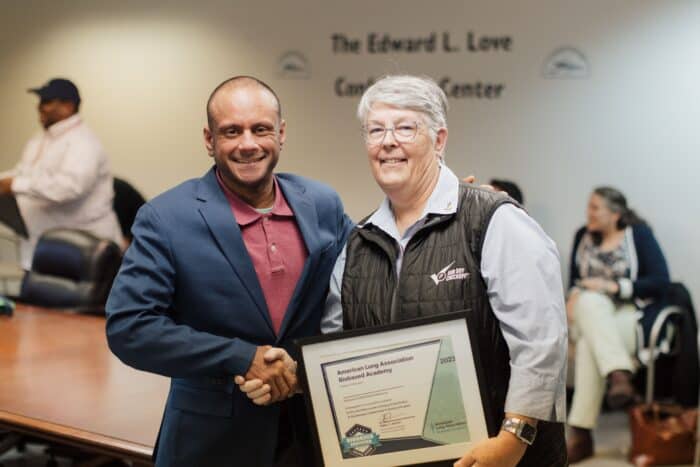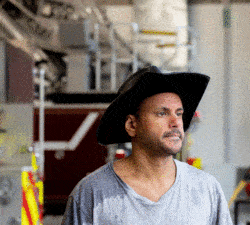MADISON, Wis. — His trademark cowboy hat bobbing as he connects with workers, Mahanth Joishy can barely contain his energy as he bounces through the garages of the City of Madison’s fleet operation. After all, it must take a lot of energy when the ambition that drives you is “to be the number one fleet in North America by helping lead a future-oriented, infrastructure-heavy revolution in transportation sustainability and vehicle safety on behalf of the entire world.”
In March, Joishy helped his city take another step on that ambitious path by leading Madison to become the first Wisconsin fleet to graduate from the Biobased Academy®.
Funded by U.S. soybean farmers, the Academy is a joint partnership led by the American Lung Association. Fleet and facility professionals who participate complete a training program on the operational, health, safety and environmental benefits of using biobased products.
Under Joishy’s leadership, the City of Madison has purchased over 1,000 Goodyear tires containing soy. It has also used thousands of gallons of biodiesel in its diesel vehicles. It’s all part of a greater city Environmental, Social and Governance plan.
“Our employees and community have high expectations,” said Joishy, who serves as a volunteer Bio Ambassador. “Increasingly they depend on our success in sustainability for their health and happiness. They demand and deserve this innovative approach.”

Mahanth Joishy helped his city take another step on that ambitious path by leading Madison to become the first Wisconsin fleet to graduate from the Biobased Academy®.
In March, Joishy traveled to Washington, D.C. to join other recently recognized fleet leaders as part of National Biobased Products Day. The other graduates of the Academy represented the District of Columbia Public Works Department, Smithsonian Institution; Port Authority of New York and New Jersey; and Cobb County, Georgia.
Soybean oil can replace petroleum-based compounds in thousands of products. Whether it’s rubber, plastics, lubricants or coatings, soy as an ingredient doesn’t sacrifice performance or competitive pricing. Checkoff-supported research leads to the commercialization of new soy-based products each year.
With about 500 diesel vehicles, Madison houses the largest truck fleet to run on biodiesel in Wisconsin and won several national awards last year. Although also a purchaser of electric vehicles, Joishy calls biodiesel usage “far more impactful” than EVs so far for Madison’s emissions reductions.
“One hundred percent of the supply originates from Wisconsin itself in a remarkable display of domestic energy production, energy security, energy independence and support for local rural and urban economies,” Joishy said. “All that while taking a sledgehammer to upstream and downstream carbon emissions.”

Joishy hopes to inspire others that can benefit from a wide array of soy-based products.
Joishy’s participation in the Academy has opened his eyes to even more possibilities, he said. In addition to tires and fuel, Joishy hopes to inspire others that can benefit from a wide array of soy-based products ranging from hydraulic fluids, hand soaps used by auto mechanics, to roads with higher levels of reclaimed asphalt and concrete durability enhancers.
“We congratulate the City of Madison on its tremendous accomplishments, a true success story of farmers and cities working together for sustainability wins,” said Tony Mellenthin, a United Soybean Board Director and farmer leader from Wisconsin “Our goal is to continue to invest in fleet education and outreach to promote the benefits of switching to renewable products made with U.S. Soy.”
Since the Academy launched publicly in October 2022, more than 30 fleet professionals from 20 communities have completed the training. The Biobased Academy not only strengthens cities and communities but also brings value back to all soybean farmers.
For more, visit SoyBiobased.org.
Because of the potential for biobased products to create new markets for soybeans, U.S. soybean farmers have invested millions of dollars to research, test and promote biobased products. Much of this work was done through the United Soybean Board, which is composed of 77 U.S. soybean farmers appointed by the U.S. Secretary of Agriculture to invest soybean checkoff funds. As stipulated in the Soybean Promotion, Research and Consumer Information Act, USDA’s Agricultural Marketing Services has oversight responsibilities for the soybean checkoff.
